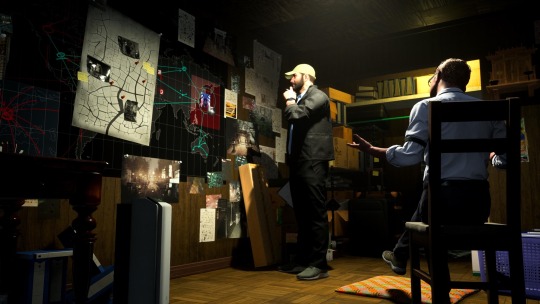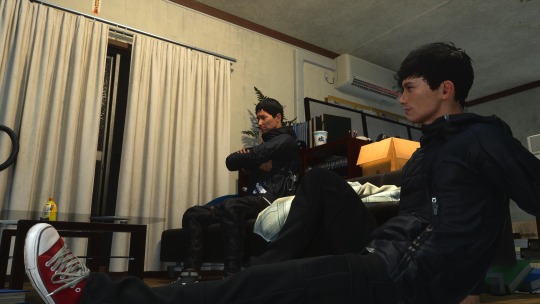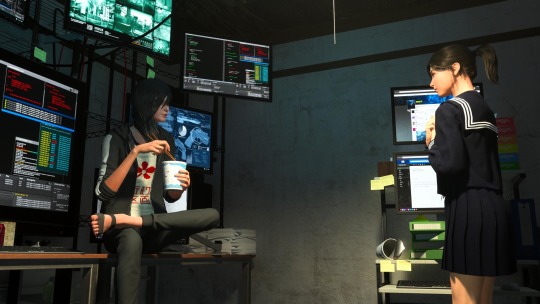#Mari IS at school wondering where Erika is today
Text



The team
#ghostwire tokyo#virtual photography#Akito izuki#kk#Ed#Dale#Rinko yakumo#erika#Ed and Dale the only ones getting any work done#Akito and kk are watching tv#well Akito is pops over there fell asleep#Rinko’s telling Erika she should be in school instead of hanging out in this stinky apartment#Mari IS at school wondering where Erika is today#my screenshots
27 notes
·
View notes
Text
UpFront Group Remote Work Chorus!
Evening
Its Ishida Ayumi
Just now,
(9:00PM)
an upload
UpFront Group Remote Work Chorus
#lovewins
#thankyouessentialworkers
#thankyoutoeveryonedoingtheirbest
#itsoktocry
#dontgiveup
#STAYHOME
#timeathome
The power of song, the power of words, the power of music, the power of dance,
What we can send out now,
Also wanting to send out our feelings of thanks,
It includes that power
This video was created
All Hello! Project Members,
Horiuchi Takao-san,
Banba Hirofumi-san,
Sugita Jirou-san,
Inaba Akira-san,
Makoto-san,
Hayashi Maya-san,
Moritaka Chisato-san,
Aida Shoko-san,
Nakazawa Yuko-san,
Iida Kaori-san,
Yaguchi Mari-san,
Tsuji Nozomi-san,
Takahashi Ai-san,
Tanaka Reina-san,
Suzuki Airi-san,
Natsuyaki Miyabi-san,
Kobayashi Hikaru-san,
Nihei Yuka-san,
Okada Robin Shoko-san,
Hashimoto Aina-san,
Goto Yuki-san,
Morozuka Kanam-san,
Tasaki Asahi-san,
Hasegawa Moemi-san,
Sawayaka Goro-san,
Suzuki Keita-san,
Watase Maki-san,
Abe Natsumi-san,
Satoda Mai-san,
Omata Masako-san,
Shinoda Junko-san,
Takayama Gen-san,
KAN-san,
Matsubara Takeshi-san,
Nakajima Takui-san,
Taisei-san,
Kato Noriko-san,
Yasuda Kei-san,
Ishikawa Rika-san,
Fujimoto Miki-san,
Niigaki Risa-san,
Iikubo Haruna-chan ❤
Kudo Haruka-chan ❤
Shimizu Saki-san,
Sudo Maasa-san,
Kumai Yurina-san,
Yajima Maimi-san,
Nakajima Saki-san,
Miyazaki Yuka-chan,
Katsuta Rina-san,
Mano Erina-san,
Miyazaki Rio-san,
Yagi Saki-san,
Miyoshi Erika-san,
Tanaka Yoshitake-san,
Furukawa Konatsu-san,
Mori Saki-san,
Saho Akari-san,
Sekine Azusa-san,
Arai Manami-san,
Sengoku Minami-san,
Kikkawa Yuu-san,
Wada Ayaka-san,
Michishige Sayumi-san,
Ozeki Mai-san,
Tokunaga Chinami-san,
Kagawa Ryo-san,
Yanagisawa Junko-san,
Also, Tsunku-san
Watching this video that connects so many people,
what shooting alone in your home by yourself,
……(>_<)
It felt lonely but,
To see it become one like this!!
Like this!!
This!!
Definitely watch the video,
I want you to feel it
The power of music is really amazing
The uneasy situation continues on now,
In that way everyone,
Because we are here,
Let’s overcome this together
When you’re not feeling well,
It seems like it would be fun to sing along
During time when you want to relax, definitely
Also again,
Now during this situation,
There are people that are still working
Thanks to those people,
We’re able to spend time at home now
Thank you very much!!!
Sending this out!
Sending--!
(Surely the Hello! jersey doesn’t feel out of place already……)

(although in this selfie I’m not wearing a Hello! jersey……)
Um, today is,
Kudo Shinichi and Edogawa Conan-kun’s
Birthday ❤
And so,
Finally,
Um, this para para!
Since I was able to dance to it,
Its fine to watch it on YouTube after,
Since its fine,
Please definitely watch a lot of people doing it
But parapara is really difficult…
I couldn’t get a hold on the nuance of the 2-step…
Yaguchi Mari-san appeared in,
“Gal Circle”
I loved it!!!
I really remember watching it,
Certainly from when I was in elementary school,
I want to ask Yaguchi-san about it someday lol
Furthermore tomorrow is,
J Fest App JAPAN JAM
On the official app “J Fest”
In a previous festival video where Morning Musume ’20 and Angermer were to perform, it will be available for a limited time from May 5th (Tue, Holiday) from noon to midnight!
With the hashtag “#JAPANJAMathome” lets all enjoy JAPAN JAM together online ❤
Official Site is here
I hope that you’ll have a wonderful day tomorrow as well
See you ayumin ❤
https://ameblo.jp/morningmusume-10ki/entry-12594659327.html
#Ishida Ayumi#Morning Musume' 20#Morning Musume#Hello! Project#Translation#Blog#sorryfortheweirdspacing
6 notes
·
View notes
Note
hey I'm a teenage girl and I'm just getting into this show and I feel like I'm not understanding how big it is/was? is there any modern day comparison you can make to help me understand? thanks! I love your blog!
First of all, I’m very sorry for the delay in answering you. Secondly, I’m so glad you like my blog and the show! I hope you are still enjoying both. And thirdly, I’m posting under a cut because this got ridiculously long, for which I apologize. I tried to give you a concise answer, I really did, but the question deserved so much more. If you hate reading long things, just ignore all my stuff and only read the quotes, which are blocked off. That should give you a pretty good idea anyway.
Your question is really good, but it’s a little tricky for me to answer, because I wasn’t actually alive when the show was first on the air. It’s also hard to answer because I assume you’re talking about the show’s cultural impact, and it’s sort of impossible to know what current show or movie is going to have that kind of impact 40 years from now.
But I think I would have to compare it to Wonder Woman. One of the reasons Wonder Woman is considered so important is that it had such a strong and well-rounded female protagonist, whose narrative revolves around her personal journey and not that of a man. It’s also the first really successful superhero movie about a woman, and that’s not a genre where you see very many female main characters, so the movie is sort of groundbreaking in that way. The Mary Tyler Moore Show is similar because, as far as I know, it was the first time a working woman was portrayed on television as the lead of her own sitcom, which was quite revolutionary. And Mary herself is really important because although she wasn’t perfect, she was a strong, mature, rounded female character who carried her own story - not unlike Diana Prince.
Here’s a quote about Wonder Woman from an article by Carrie Witmer:
The thing that matters most about “Wonder Woman” is the portrayal of Wonder Woman/Diana Prince herself. Gal Gadot’s Wonder Woman is a fully realized character. She’s emotional, confident, yet also insecure. She has hope and she has fear. She can love and lust and she can feel sadness and joy. She’s not just a beautiful face or hot body kicking ass.
Compare that to this quote about The Mary Tyler Moore Show, from a blog post by Erika Schmidt:
The Mary Tyler Moore Show was about a woman in her thirties living her life. Not within the context of her perfect marriage, or her continued wacky attempts to sneak into her husband’s show, or her quirky adventures as a mom/witch. It was, comparatively speaking, real. She worked, she dated. She threw terrible parties. Her friendships were of obvious and incalculable value. She was graceful, clumsy, timid, brave. She developed before our eyes. Mary Richards can’t be described in one sentence. And that is the point. That is what makes her a feminine icon.
The Wonder Woman comparison does break down a bit for a couple reasons: One, The Mary Tyler Moore Show actually drew a lot of heat from the feminist movement at the time, because people didn’t think it was going far enough. I haven’t seen any criticism of that sort about Wonder Woman, which doesn’t mean it doesn’t exist, but it doesn’t seem to be as common. Two, Wonder Woman is a movie set in World War 1, and The Mary Tyler Moore Show is a sitcom set in the decade in which it originally aired. So it’s not a good comparison in terms of format.
I don’t actually watch that many TV shows, but one of the few shows I do enjoy is Brooklyn Nine-Nine. B99 is a sitcom set in the workplace that regularly brings up social issues in a sort of low-key, subtle way, and that’s also what The Mary Tyler Moore Show did. The Mary Tyler Moore Show brought up issues like equal pay and birth control, whereas Brooklyn Nine-Nine brings up things like transphobia and racial profiling, but on either show, it’s rarely done in a way that makes the issue the focus of the episode. And that can be very powerful.
Here’s a quote from an article about Brooklyn Nine-Nine by Alyssa Rosenberg:
“Brooklyn Nine-Nine” has always been unusual in the series’ ability to find unpredictable routes into a wide range of issues in contemporary policing. In four seasons, it’s tackled everything from the New York Police Department’s history of racism and homophobia, to the abuse of internal affairs investigations, to how different city agencies work together, to how overzealousness can influence even a good cop’s judgement.
Compare that to this quote from an article about The Mary Tyler Moore Show by Alexis Sottile:
Over the course of the show’s seven seasons, Mary evolved with the times, tackling infidelity, birth control, sex, job promotions and the general human condition with the same mix of pluckiness, aplomb and oh-shit-do-I-really-have-to-do-this that made her an accessible role model for the new woman – and a sympathetic character for those that were scared of this new breed.
I’ll give a specific example: In season 3, there’s a brief reference to Mary taking the birth control pill. It was just a tiny snippet of dialogue, but it helped shift societal opinions on women being sexually active outside of marriage, which was still very controversial in the 70s’. The book “Mary and Lou and Rhoda and Ted” by Jennifer Keishin Armstrong includes this quote (p. 172) by Treva Silverman, who was one of the head writers on the show:
Mary was a “nice girl,” in quotation marks… If Mary was taking the Pill, it gave the stamp of approval for sexuality.
Treva Silverman, in case you didn’t know, is a woman. And that’s another huge impact the show had: It actively sought out female writers at a time when there was still a huge stigma against women in television production. (Here’s a good article about that.)
The show actually motivated lots of women to enter the field of television, and not just the women they hired to write for the show. Mary Richards was a very inspiring figure. Here’s a quote from TV journalist Katie Couric:
I don’t think I’d have this job if it weren’t for Mary Richards, and I mean that. They say if you can’t see it, you can’t be it, and when I saw Mary Richards make it on her own, driving that Mustang to that TV station in Minneapolis, I was in junior high, I thought, “Wow, I can have a career too.”
Oprah Winfrey, who was the first ever female African American billionaire, credits Mary Tyler Moore with having “more influence on [her] career than any other single person or force.” And “Mary and Lou and Rhoda and Ted” includes this quote from her (p. 283):
[The Mary Tyler Moore Show] was a light in my life, and Mary was a trailblazer for my generation. She’s the reason I wanted my own production company.
Even beyond the world of television and journalism, women were inspired. Here’s a quote from former First Lady Michelle Obama:
She was one of the few single working women depicted on television at the time. She wasn’t married. She wasn’t looking to get married… I was probably 10 or 11 when I saw that, and sort of started thinking, “You know what? Marriage is an option. Having a family is an option. And going to school and getting your education and building your career is another really viable option that can lead to happiness and fulfillment.”
And here’s a quote from another of the shows’ writers, Sybil Adelman Sage:
Before Mary Tyler Moore, it was acceptable to be a secretary, but not to be unmarried. Suddenly it was fine to be unmarried, and we were reaching for better jobs. Along with that blue beret, the rules had been thrown in the air. The show was arguably the most transformative sitcom in television history, forever changing how women were perceived.
Another notable, although less talked-about, influence the show had is that it revolutionized the sitcom format in general. If you’ve ever seen a realistic, character-driven comedy show with a strong cast of secondary characters, then you can thank The Mary Tyler Moore Show for making that format so popular. You can see that influence today in shows like The Office, Parks and Recreation, 30 Rock, The Mindy Project, Friends, and probably any other sitcom you can think of. (Here’s a good article about that.) I actually can’t think of a good modern-day comparison here because every sitcom I don’t know of anything that is visibly changing the television landscape as much as The Mary Tyler Moore show did in its time.
Here’s a quote from an article written by Jerry Buck as the show was entering its 4th season:
“The Mary Tyler Moore Show” took 20 years of pointless, insipid television situation comedy and spun it on its heels. The Moore show, going into its fourth year on CBS, pioneered reality comedy and the establishment of clearly defined and motivated secondary characters.
And according to this quote from a more recent article by Todd VanDerWerff:
Like [The Dick Van Dyke Show], Mary Tyler Moore would derive much of its comedy from its characters, rather than its punchlines. Where Moore went beyond Van Dyke came in just how thoroughly it embraced that template… [This] method of sitcom writing would, over time, become the dominant one. Even the least sophisticated sitcoms on TV now must at least pay lip-service to character complexity.
Another impact that the show had, and continues to have, is that it makes people happy. It’s just a really nice, positive, feel-good show. And that can be really important too. Here’s a quote from fashion designer Isaac Mizrahi:
[Mary Richards] proved to us again and again that if you put yourself into your world in the right way, if you pay attention to your own story, you can find the right people and the right place and be happy… The Mary Tyler Moore Show was one of the first examples of someone choosing her own family that we saw on television.
Honestly, I feel like I’ve only scratched the surface here. In case you’re not totally exhausted from reading all this and you’d like to read more on the subject, I’ve gone back through my blog and added an “impact” tag for you to look through if you’re interested. I should warn you that some of the posts reference specific episodes and that might be spoilers for you depending on where you’re at in the series.
Thanks again for your excellent question! If you have more questions or if you just want to chat, my askbox and private messaging system are always open for that.
7 notes
·
View notes